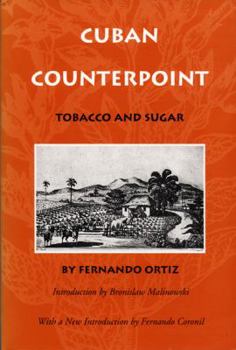Cuban Counterpoint: Tobacco and Sugar
Select Format
Select Condition 
Book Overview
First published in 1940 and long out of print, Fernando Ortiz's classic work, Cuban Counterpoint is recognized as one of the most important books of Latin American and Caribbean intellectual history. Ortiz's examination of the impact of sugar and tobacco on Cuban society is unquestionably the cornerstone of Cuban studies and a key source for work on Caribbean culture generally. Though written over fifty years ago, Ortiz's study of the formation of...
Format:Paperback
Language:English
ISBN:0822316161
ISBN13:9780822316169
Release Date:February 1995
Publisher:Duke University Press
Length:408 Pages
Weight:1.28 lbs.
Dimensions:1.1" x 5.6" x 8.3"
Related Subjects
Agricultural Sciences Agriculture Business Business & Finance Business & Investing Caribbean & West Indies Contemporary Cuba Economic History Economics Education & Reference Engineering Europe Foreign Language Fiction Foreign Language Study & Reference History Industries & Professions Latin America Literature & Fiction Science & Math Spain Technology Textbooks Tropical AgricultureCustomer Reviews
4 ratings
Not Spanish
Published by Edie , 3 years ago
In order to experience the full impact of Dr. Ortiz's writing, it is necessary to read his works in Spanish. For instance, "colunterpoint" in English is "contrapunto" in Spanish, a clear musical reference to Cuban music. Ortiz's works are a rich amalgam of sensual musical, cultural, religious allusions in endless intoxicating combinations unfortunately lost in brute translation. To read his works in Spanish is a total sensory immersive experience clothed in peerless scholarship. Dr. Ortiz was a polymath and a true genius.
Effective
Published by Thriftbooks.com User , 14 years ago
Extended early twentieth century analysis of the titular themes, tracking the comparative impact of Tobacco and Sugar on Cuba. Starts with the premise of a very dry subject matter, but quickly makes it fascinating, rolling off fascinating insights, neat connections, stunning juxtapositions and effective systemic analysis. The look into the philosophy and aesthetic behind each plant is entertaining, the argument for how each substance is gendered intriguing, but it's in the overview of how the economics functioned that really make the book take of is the insight into economics. Ortiz argues persuasively that while it's the most pleasant crop, sugar has also directly accompanied a process of standardization, mass production, mechanization and foreign exploitation of Cuba that connects a very destructive long term legacy. In contrast, he explores venues by which Tobacco has had the potential for autonomy and overall financial advantage. The first half is a surprisingly engaging and fast moving chain of analysis that offers much of worth in asssessing colonial and postcolonial conditions generally. After that, the second half is far less satisfying, as it goes into listing and specifics to substantiate the main thesis, slowing the main pace down to a crawl and rendering large setions frankly boring. Still, taken as a whole this is an exciting and virtal work.
The starting-point for Cuban studies
Published by Thriftbooks.com User , 14 years ago
If you are thinking about studying Cuban history and society, or if you just want to extend your knowledge of it, this book is a must on either case. Cuban Counterpoint should be taken as the starting-point for Cuban history and society studies. Ortiz brilliantly reveals the importance that the island's two major economic products have played over the years and the contrast among them throughout society. It is very important for a first time reader to read each respective introduction in order to have better understanding of how this work came about, in which period of time it was completed and its significance to Cuban studies. The first part of the book is the central focus of Ortiz' work and even though the second part might feel a bit boring at times, it does contains some vital content. Again, overall the book is a must in order to fully understand Cuban history and society; enjoy reading it.
A Classic
Published by Thriftbooks.com User , 23 years ago
This book has become a classic for all of us who study Cuba's history and society. However, I must also recommend the book for any student of social and cultural anthropology interested in cross cultural interactions and acculturation ("transculturación" in Ortiz's own words. It is incredible that his ideas on this subject have been mostly ignored by the United States anthropological community, despite the strong support Ortiz received from Bronislaw Malinowsky. I highly recommend it.






